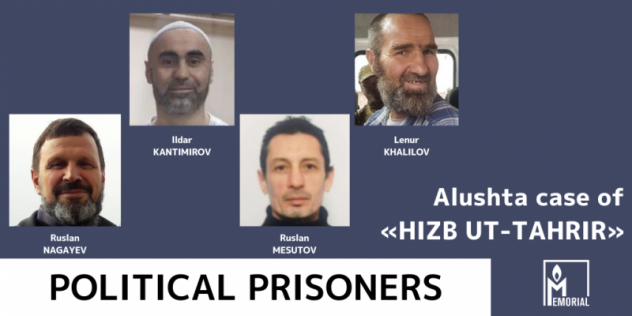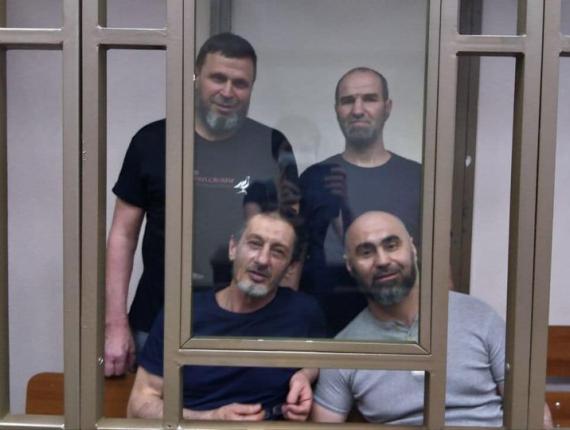Four Crimean Tatars charged with participation in the banned Hizb ut-Tahrir are political prisoners, Memorial says
Ruslan Mesutov, Lenur Khalilov, Ruslan Nagayev and Eldar Kantimirov, all from the town of Alushta in Crimea, are being prosecuted under ‘terrorism’ articles of the Russian Criminal Code without having been charged with terrorism
In line with international guidelines defining the term ‘political prisoner,’ Memorial Human Rights Centre considers the Crimean Tatars Eldar Kantimirov, Ruslan Mesutov, Ruslan Nagayev and Lenur Khalilov political prisoners. The four Muslims have been remanded in custody for the non-violent exercise of the rights to freedom of conscience, religion and association. We demand their immediate release.
-
FSB: Membership of Hizb ut-Tahrir is terrorist activity
Eldar Kantimirov, Ruslan Mesutov, Ruslan Nagayev and Lenur Khalilov were detained in the summer of 2019 in the town of Alushta and nearby villages on suspicion of involvement in the international organisation Hizb ut-Tahrir al-Islami (Islamic Liberation Party, designated as a terrorist organisation in Russia in 2003). All are accused of offences under Article 205.5 of the Criminal Code (‘Organisation of, or participation in, the activities of a terrorist organisation’).
In early 2018 Ruslan Mesutov and Lenur Khalilov, according to the investigation, organised a cell of Hizb ut-Tahrir in Alushta in which they ‘involved’ Ruslan Nagayev, Eldar Kantimirov and a small number of other ‘unidentified persons.’
The group's activity consisted mainly of systematic self-education classes (‘halaqa’). The believers studied Islam, the history of the Islamic caliphate, and the ideology of Hizb ut-Tahrir (using the books The Concept of Hizb ut-Tahrir, Property in the State of the Caliphate, etc.). Also at these classes the activists discussed the prosecution of ‘brothers’ and the issue of providing assistance to them - currently, there are more than 80 Crimean Tatars alone who have been imprisoned for participation in Hizb ut-Tahrir.
The FSB made secret audio recordings of six such ‘halaqas’ and the charges are based on these recordings.
In making these secret tapes the security services recorded the wish of these residents of Alushta to create an ideal Muslim state in the distant future (a revival of the worldwide Islamic caliphate), which should include Crimea, and this has led to them being charged with an offence under Part 1 of Article 30 in conjunction with Article 278 of the Russian Criminal Code (‘Preparation for the forcible seizure of power’).
-
Why Memorial considers the four to be political prisoners
The four Crimean Muslims turned out to be guilty only of having been members of a religious civil society association. They have not been charged with preparing terrorist attacks.
The prosecution of the four residents of Alushta violates Article 28 of the Russian Constitution that guarantees everyone ‘freedom of conscience, freedom of religion.’
 Memorial considers the designation of Hizb ut-Tahrir as a terrorist organisation unlawful. This Supreme Court decision, based on a brief ‘report’ from the FSB, devotes one paragraph of three sentences to Hizb ut-Tahrir. These sentences contain no evidence of terrorist activities.
Memorial considers the designation of Hizb ut-Tahrir as a terrorist organisation unlawful. This Supreme Court decision, based on a brief ‘report’ from the FSB, devotes one paragraph of three sentences to Hizb ut-Tahrir. These sentences contain no evidence of terrorist activities.The defendants also supported other Crimean Tatars and their families prosecuted by the Russian authorities. The charge of involvement in Hizb ut-Tahrir has become a convenient and frequently used instrument to suppress the movements of solidarity among those living in Crimea.
Recognition of an individual as a political prisoner or as a victim of politically motivated prosecution does not imply Memorial Human Rights Centre agrees with, or approves of, their views, statements, or actions.
More information about the opinion of Memorial on this case is available on our website.
How you can help
Letters to political prisoners in Crimea can be sent via the website of the organisation Crimean Solidarity.
You can support all political prisoners by donating to the Fund to Support Political Prisoners of the Union of Solidarity with Political Prisoners via PayPal, using the e-wallet at helppoliticalprisoners@gmail.com.
Поделиться:
- ВКонтакте
- РћРТвЂВВВВВВВВнокласснРСвЂВВВВВВВВРєРСвЂВВВВВВВВ
- Telegram


